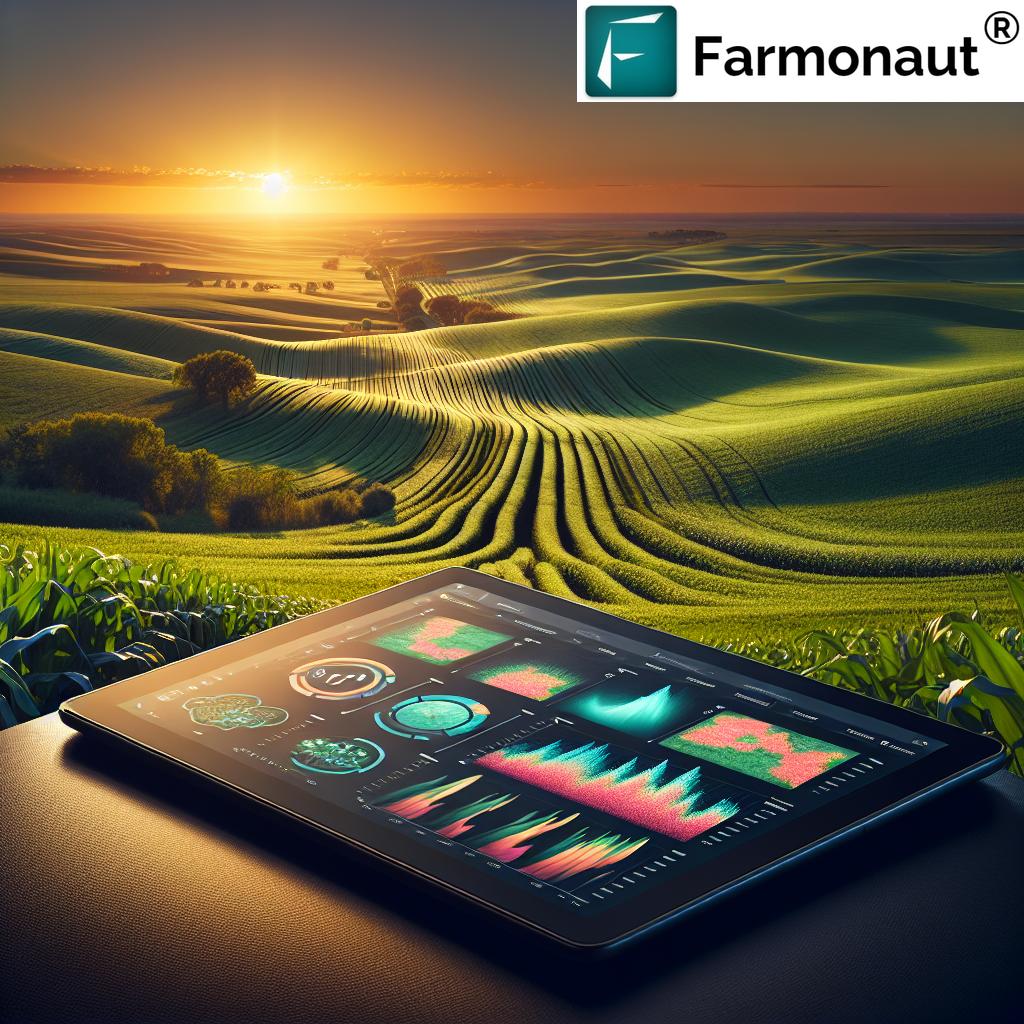Massachusetts Agriculture: Farming Trends & Growth 2025
“In 2025, over 60% of Massachusetts farms are projected to adopt sustainable soil management practices.”
“Local food systems in Massachusetts are expected to supply 35% more produce to communities by 2025.”
Meta Description: Massachusetts agriculture in 2025 offers a forward-looking perspective on sustainable farming, showcasing growth, technological innovation, and opportunities in the state’s unique agricultural sector.
- Introduction: Massachusetts Agriculture in 2025
- Historical and Economic Context of Agriculture in Massachusetts
- Key Agricultural Products: Fruits, Vegetables & Specialty Goods
- Sustainability and Environmental Stewardship in Massachusetts Farming
- Technological Advancements & Innovation
- Trends Table: Sustainable Farming Comparison 2024 vs. 2025
- Farmonaut: Satellite Technology Empowering Modern Agriculture
- Challenges and Outlook for the Future of Massachusetts Agriculture
- Frequently Asked Questions
- Conclusion: The Road Ahead for Massachusetts Agriculture
Introduction: Massachusetts Agriculture in 2025
Agriculture of Massachusetts has long held a distinctive place in both the state’s economy and its cultural heritage. As we move into 2025, farming in Massachusetts exemplifies a remarkable blend of tradition and forward-thinking innovation. This article explores the current landscape of Massachusetts agriculture, focusing on the transformative trends of sustainable practices, regional market growth, cutting-edge technologies, and opportunities that shape the industry’s future.
With the emergence of environmental stewardship, climate-responsive techniques, and high consumer demand for local food systems, the state’s agricultural sector is at a pivotal moment. Here, we provide a comprehensive overview of these dynamics and highlight how Massachusetts farming continues to set benchmarks for sustainability and innovation as it navigates unprecedented challenges and discovers new avenues for growth.
Historical and Economic Context of Agriculture in Massachusetts
A Rich Tradition Dating Back to Colonial Times
The roots of agriculture in Massachusetts trace back over 400 years, beginning with the first colonial farms that leveraged the state’s fertile soil and diverse climates. As one of the earliest farming hubs in New England, Massachusetts developed distinctive approaches to crop and livestock production—practices shaped by proximity to the Atlantic Ocean, nearby forests, and major urban centers like Boston. Throughout its evolution, Massachusetts agriculture has consistently adapted to changing market dynamics, technological advancements, and environmental challenges while maintaining its role in shaping the state’s identity.
Economic Contributions of Massachusetts Farming
Massachusetts farming is not as extensive as some larger midwestern states, but its impact is significant. In 2025, agriculture in Massachusetts generates well over $500 million annually in direct farm sales, supporting thousands of jobs within rural communities and related agribusinesses. Its sectors include:
- Niche and specialty crops—notably cranberries, apples, and organic produce, cultivated across smaller-scale operations
- Dairy and livestock production—contributing to the local economy and food supply chains
- Greenhouse and controlled-environment farming—helping meet year-round demand for fresh foods and high-value crops
The continuing evolution of Massachusetts agriculture is driven by evolving consumer preferences, new market demands, and environmental imperatives, making adaptability and innovation essential for sustainable growth.
Key Agricultural Products: Fruits, Vegetables & Specialty Goods
Signature Massachusetts Crops
- Cranberries: Massachusetts remains one of the top producers of cranberries in the United States. With historic bogs in southeastern counties, especially Plymouth and Barnstable, the state’s cranberry industry is a hallmark defining its agricultural character.
- Apples: The state’s diverse microclimates support apple orchards that produce numerous varieties—such as McIntosh, Cortland, and Empire—central to Massachusetts commerce and agritourism.
- Berries: Blueberries, strawberries, and raspberries are grown widely, leveraging the state’s fertile soils and adding diversity to farm operations.
- Vegetables: Sweet corn, pumpkins, squash, carrots, and tomatoes are important crops, favoring direct sales through farmer’s markets, roadside stands, and the flourishing “pick-your-own” sector.
- Dairy: While the number of dairy farms has declined, Massachusetts continues to support robust milk and artisanal cheese production, contributing to local food systems.
- Organic & specialty products: The sector is expanding with organic vegetables, maple syrup, honey, and niche fruits, fueled by consumer interest in health, sustainability, and locally sourced foods.
Controlled-Environment & Greenhouse Innovation
Massachusetts farmers have embraced greenhouses and controlled-environment agriculture, allowing longer and more predictable growing seasons, regardless of climate shocks. New facilities produce:
- High-value greens (lettuces, herbs, microgreens)
- Tomatoes, peppers, cucumbers, and other vegetables year-round
- Ornamental nursery crops—supporting landscaping and retail markets
These systems reduce water use, optimize soil health, and limit the need for chemical inputs, aligning with sustainable agriculture practices in the state.
Sustainability and Environmental Stewardship in Massachusetts Farming
The Central Role of Sustainable Practices
As climate variability and resource constraints intensify, Massachusetts agriculture is undergoing transformation—making sustainable farming practices central to the future. By 2025, more than 60% of local farms are projected to implement sustainable soil management practices, like crop rotation, cover cropping, and minimal tillage. These approaches help maintain productive soils, reduce erosion, and increase biodiversity.
Precision Agriculture: Data-Driven Environmental Management
- Precision tools—such as GPS-guided equipment, satellite imagery, field mapping, and soil sensors—allow Massachusetts farmers to apply water, fertilizers, and pesticides only where and when needed.
- This technology-driven approach reduces input costs, lowers waste, and minimizes environmental impacts.
We at Farmonaut offer affordable satellite-based monitoring and AI-driven advisory systems to enhance productivity and sustainability at every scale of farming. Our carbon footprinting platform empowers farmers, agribusinesses, and policymakers with insights needed to measure, report, and reduce agricultural carbon emissions—helping Massachusetts farming transition toward climate-resilient practices.
Regenerative and Conservation-Based Approaches
An increasing number of farms are pursuing regenerative practices that restore soil health and sequester carbon—such as integrating agroforestry, cover crops, rotational grazing for livestock, and biodiversity corridors. These efforts not only enhance sustainability but also:
- Improve crop yields over time
- Increase resistance to weather extremes
- Promote pollinator and wildlife habitat
- Reduce long-term dependency on chemical fertilizers
Government Initiatives and State Support
The state is actively promoting product traceability tools and providing grants, education, and technical resources to support sustainable transitions. Financial incentives help offset the upfront costs of new technologies, irrigation systems, and renewable energy installations, making the environmental stewardship movement broadly accessible to new and veteran farmers alike.
Technological Advancements & Innovation in Massachusetts Agriculture
STEM Ecosystem Drives AgriTech Innovation
Massachusetts is renowned for its robust research and innovation culture—home to countless STEM institutions, startups, and pioneering agricultural enterprises. Recent advancements have brought the future of farming into the present, especially in areas like:
- Automated milking systems—boosting efficiency for dairy farmers and reducing labor
- Drone-powered crop surveillance—enabling remote pest and disease monitoring
- AI-driven soil analytics—delivering hyper-local, data-based crop management strategies
- Blockchain-based traceability—offering food supply chain transparency, safety, and consumer trust
- Mobile and Web Apps—for real-time farm management, crop health monitoring, and weather forecasting
Indoor, Urban, & Vertical Farming Systems
In response to limited agricultural land and urban sprawl—particularly near Boston and other population centers—Massachusetts has become a national leader in urban and vertical farming innovation. By combining controlled lighting, advanced hydroponics, and minimized footprints, these farms:
- Provide year-round production of fresh, healthy foods close to where people live and work
- Reduce transportation costs, emissions, and supply chain risks
- Utilize renewable energy sources (solar, wind, geothermal) for sustainable operation
- Promote job creation in both high-tech agricultural and supporting service roles
Our large-scale farm management solution enables agricultural businesses to seamlessly scale operations, using satellite-based monitoring, resource tracking, and AI-assisted workflow automation. This technology is critical for the ongoing transformation toward modern, sustainable farming in Massachusetts.
Advancing Sustainable Resource Management
- Fleet and resource administration—connects machinery and vehicle logistics directly with planting, irrigation, and harvest schedules. Our fleet management platform enables greater efficiency for Massachusetts farmers and agri-businesses, reducing operating costs.
- Financial efficiency—Farmonaut’s crop loan and insurance verification tool leverages satellite data to accelerate and secure financing for qualifying Massachusetts farms.
Massachusetts Sustainable Farming Trends: 2024 vs. 2025 (Estimated)
| Sustainable Practice | 2024 (Estimated Value) | 2025 (Projected Value) | % Growth/Change (2024-2025) |
|---|---|---|---|
| Organic Acreage | 8,000 acres | 8,900 acres | +11.25% |
| Use of Cover Crops | 55% of farms | 62% of farms | +12.7% |
| Drip Irrigation Adoption | 39% of farms | 44% of farms | +12.8% |
| Participation in Local Food Markets | 63% of farms | 72% of farms | +14.3% |
| Renewable Energy Utilization | 27% of farms | 33% of farms | +22.2% |
| Farms Receiving Sustainability Certification | 490 farms | 575 farms | +17.3% |
Table: Sustainable farming practices in Massachusetts are projected to experience substantial growth between 2024 and 2025, addressing both local food demands and climate resilience.
Farmonaut: Satellite Technology Empowering Modern Massachusetts Agriculture
As Massachusetts agriculture in 2025 becomes ever more reliant on data-driven decision making, our mission at Farmonaut is to democratize access to satellite-powered, AI-based agricultural tools. Here’s how we seamlessly fit into and support the evolving agricultural landscape:
- Satellite-Based Monitoring: By leveraging cutting-edge multispectral satellite imagery, we provide farmers with instant, affordable insights into crop health, soil conditions, and field variability, helping optimize resources and minimize crop stress.
- AI Advisory & Real-Time Environmental Insights: Our Jeevn AI Advisory system offers personalized, data-backed recommendations for Massachusetts farmers—enhancing productivity and supporting swift adaptation to local climate challenges.
- Blockchain Traceability: Ensures every step of the Massachusetts food supply chain is transparent, authentic, and secure, instilling trust among consumers and suppliers.
- Fleet & Resource Management: Our platform helps farm managers streamline equipment usage and logistics—lowering overheads and reducing environmental footprints.
- Environmental Impact Tracking: Includes real-time carbon footprint monitoring, aiding Massachusetts in its commitment to sustainability and environmental stewardship.
-
API Integration: Developers, researchers, and businesses in Massachusetts can harness our advanced
satellite API
and access the latest geospatial data for research, custom tools, and analytics. Explore our
API Developer Docs for details.
All of our solutions are cloud-based and mobile-ready, ensuring that both large Massachusetts agribusinesses and individual farmers can access real-time, actionable insights anytime, anywhere—whether in the field, office, or on the go.
Challenges and Outlook for the Future of Massachusetts Agriculture
Land, Demographics, and Development Pressures
- High land costs and suburban sprawl: With Boston and surrounding urban zones continually expanding, available acreage for traditional farming is under threat. Prevention of farmland loss through preservation programs and tax incentives remains critical.
- Aging farmer population: Over 40% of Massachusetts farmers are now over 55 years old. Succession planning, mentorship, and supporting new, young, and immigrant farmers are vital for sustained growth.
Environmental & Policy Challenges
- Climate volatility: Increased instances of drought, flooding, and erratic weather patterns necessitate robust, flexible farming techniques—making risk management and disaster planning essential.
- Regulatory demands: New state and federal sustainability mandates require farmers to adopt conservation, renewable energy, and carbon reduction practices—sometimes with limited financial or technical support.
- Consumer expectations: Modern buyers increasingly demand transparent supply chains, local origin, freshness, low-carbon impact, and organic certification—pushing farmers toward greater accountability.
Opportunities for Resilience and Growth
- Integration of tradition and technology: Embracing new farming approaches while sustaining Massachusetts’s distinctive agricultural heritage will reinforce consumer loyalty and market strength.
- Expanding local and regional food networks—direct-to-consumer sales, farmer’s markets, community-supported agriculture (CSA), and institutional procurement are expected to increase by 35% by 2025, according to projections.
- Education and partnerships—additional training in AgTech, digital tools, and sustainable farm management are becoming prerequisites for Massachusetts farmers who wish to thrive in a rapidly changing environment.
Frequently Asked Questions
What are the top agricultural products in Massachusetts in 2025?
In 2025, Massachusetts agriculture continues to be recognized for cranberries, apples, berries, sweet corn, pumpkins, dairy, maple syrup, and an expanding range of organic and specialty foods.
How is sustainability being adopted in Massachusetts agriculture?
By 2025, over 60% of Massachusetts farms employ soil health management practices like cover cropping, reduced tillage, precision irrigation, and regenerative farming methods. Increased use of renewable energy, organic acreage, and product traceability are hallmarks of the state’s shift toward environmental stewardship.
What role does technology play in the growth of agriculture in Massachusetts?
Technology is foundational to Massachusetts farming in 2025. Innovations include satellite crop health monitoring, drone-based surveys, AI-driven advisory systems, blockchain traceability, digital farm management platforms, and mobile applications for better resource management and productivity.
What challenges does agriculture of Massachusetts face?
Major challenges include shrinking farmland due to urbanization, aging workforce, high land prices, climate change, and increasingly stringent regulatory demands for sustainability, carbon reduction, and food transparency.
How does Farmonaut’s technology support Massachusetts agriculture?
We provide Massachusetts farmers and agribusinesses with affordable access to satellite-based monitoring, AI advisory, blockchain traceability, resource tracking, and real-time carbon footprint analysis—empowering faster, more sustainable, and data-driven decisions.
Where can I access Farmonaut’s agricultural technology and services?
Our solutions are available through our Web and Mobile Apps, with APIs for developers and enterprises. Explore full product details and resources on our website.
Conclusion: The Road Ahead for Massachusetts Agriculture
The agriculture of Massachusetts in 2025 is a vibrant tapestry woven from centuries-old traditions, modern technologies, and shared commitment to a sustainable, resilient, and innovative future. As pressures mount from changing climates, consumer demands, and economic realities, the sector’s ability to blend heritage wisdom with cutting-edge advancements defines its continued regional and national importance.
Statewide adoption of precision tools, satellite monitoring, AI-driven resource management, and sustainability certifications is accelerating. Massachusetts farming now stands as a nationwide model for ecological stewardship and economic adaptation—supplying fresh, nutritious food to local communities, maintaining rural livelihoods, and contributing to environmental sustainability on a larger scale.
We at Farmonaut remain dedicated to supporting the journey of every Massachusetts farmer, policymaker, and agri-innovator—making satellite-driven insights, sustainability, and operational efficiency accessible for all. Tomorrow’s farms will thrive on a foundation of transparency, adaptability, and community strength—ensuring that Massachusetts agriculture remains a beacon of growth and environmental responsibility for generations to come.
Transform your Massachusetts agriculture operation with next-generation tools. Discover Farmonaut for advanced monitoring and sustainable growth.














